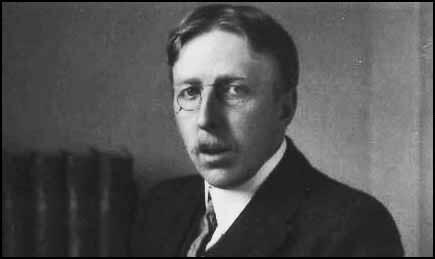On this day on 26th June
On this day in 1483 Richard III becomes King of England. Richard had Prince Edward and his younger brother, Richard, taken into custody. Soon rumours began to circulate that Richard had arranged for his two nephews to be murdered. Opposition to Richard was led by the Lancastrian, Henry Tudor.
In August 1485, Henry Tudor arrived in Wales with 2, 000 of his supporters. He also brought with him over 2, 000 mercenaries recruited from French prisons. While in Wales, Henry also persuaded many skillful longbowmen to join him in his fight against Richard. By the time Henry Tudor reached England the size of his army had grown to 5,000 men.
When Richard heard about the arrival of Henry he marched his army to meet his rival for the throne. On the way, Richard tried to recruit as many men as possible to fight in his army, but by the time he reached Leicester he only had an army of 6,000 men. The earl of Northumberland also brought 3,000 men but his loyalty to Richard was in doubt.
Richard sent an order to Lord Thomas Stanley and Sir William Stanley, two of the most powerful men in England, to bring their 6,000 soldiers to fight for the king. Richard had been informed that Lord Stanley had already promised to help Henry Tudor. In order to persuade him to change his mind, Richard arranged for Lord Stanley's eldest son to be kidnapped.
On 21 August 1485, King Richard's army positioned themselves on Ambien Hill, close to the small village of Bosworth in Leicestershire. Henry arrived the next day and took up a position facing Richard. When the Stanley brothers arrived they did not join either of the two armies. Instead, Lord Stanley went to the north of the battlefield and Sir William to the south. The four armies now made up the four sides of a square.
Without the support of the Stanley brothers, Richard looked certain to be defeated. Richard therefore gave orders for Lord Stanley's son to be brought to the top of the hill. The king then sent a message to Lord Stanley threatening to execute his son unless he immediately sent his troops to join the king on Ambien Hill. Lord Stanley's reply was short: "Sire, I have other sons."
Henry Tudor's forces now charged King Richard's army. Although out-numbered, Richard's superior position at the top of the hill enabled him to stop the rival forces breaking through at first. When the situation began to deteriorate, Richard called up his reserve forces led by the earl of Northumberland. However, Northumberland, convinced that Richard was going to lose, ignored the order.
Richard's advisers told him that he must try to get away. Richard refused, claiming that he could still obtain victory by killing Henry Tudor. He argued that once the pretender to the throne was dead, his army would have no reason to go on fighting.
A few of his close friends agreed to accompany him on his mission. So that everyone knew who he was, Richard put on his crown. After choosing an axe as his weapon, Richard and a small group of men charged down the hill.
Henry's guards quickly surrounded their leader. Before Richard could get to Henry, he was knocked off his horse. Surrounded by the enemy, Richard continued to fight until he was killed.
Tradition has it that Richard's crown was found under a gorse bush. Lord Stanley, whose intervention had proved so important, was given the honour of crowning Henry VII the new king of England and Wales.
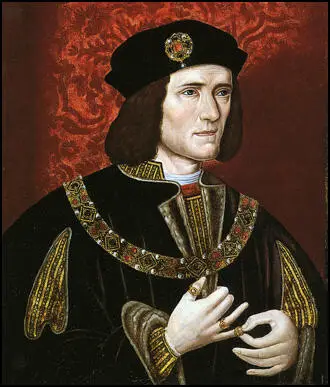
Richard III
On this day in 1823 Henry Hunt makes a speech on class conflict. "I am an enemy to corn laws, game laws, and to all laws that mark a degrading contrast between the lazy and the industrious. There must be high and low, rich and poor; but the honest working man ought to have all the conveniences of life, and some of its comforts."
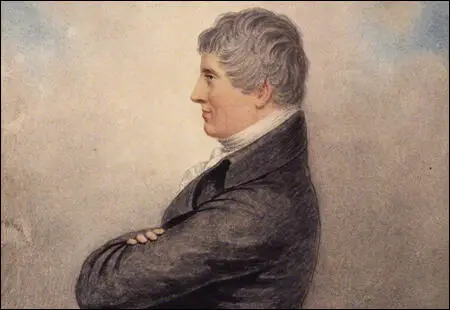
On this day in 1884 the Parliamentary Reform Act is passed by the House of Commons. The bill was passed by the Commons on 26th June, with the opposition did not divide the House. The Conservatives were hesitant about recording themselves in direct hostility to franchise enlargement. However, Gladstone knew he would have more trouble with the House of Lords. Prime Minister William Gladstone wrote to twelve of the leading bishops and asked for their support in passing this legislation. Ten of the twelve agreed to do this. However, when the vote was taken the Lords rejected the bill by 205 votes to 146.
Queen Victoria thought that the Lords had every right to reject the bill and she told Gladstone that they represented "the true feeling of the country" better than the House of Commons. Gladstone told his private secretary, Edward Walter Hamilton, that if the Queen had her way she would abolish the Commons. Over the next two months the Queen wrote sixteen letters to Gladstone complaining about speeches made by left-wing Liberal MPs.
The London Trades Council quickly organized a mass demonstration in Hyde Park. On 21st July, an estimated 30,000 people marched through the city to merge with at least that many already assembled in the park. Thorold Rogers, compared the House of Lords to "Sodom and Gomorrah" and Joseph Chamberlain told the crowd: "We will never, never, never be the only race in the civilized world subservient to the insolent pretensions of a hereditary caste".
Queen Victoria was especially angry about the speech made by Chamberlain, who was President of the Board of Trade in Gladstone's government. She sent letters to Gladstone complaining about Chamberlain on 6th, 8th and 10th August, 1884. Edward Walter Hamilton, Gladstone's private secretary replied to the Queen explaining that the Prime Minister "has neither the time nor the eyesight to make himself acquainted by careful perusal with all the speeches of his colleagues."
In August 1884, William Gladstone sent a long and threatening memorandum to the Queen: "The House of Lords has for a long period been the habitual and vigilant enemy of every Liberal Government... It cannot be supposed that to any Liberal this is a satisfactory subject of contemplation. Nevertheless some Liberals, of whom I am one, would rather choose to bear all this for the future as it has been borne in the past, than raise the question of an organic reform of the House of Lords... I wish (an hereditary House of Lords) to continue, for the avoidance of greater evils... Further; organic change of this kind in the House of Lords may strip and lay bare, and in laying bare may weaken, the foundations even of the Throne."
Other politicians began putting pressure on Victoria and the House of Lords. One of Gladstone's MPs advised him to "Mend them or end them." However, Gladstone liked "the hereditary principle, notwithstanding its defects, to be maintained, for I think it in certain respects an element of good, a barrier against mischief". Gladstone was also secretly opposed to a mass creation of peers to give it a Liberal majority. However, these threats did result in conservative leaders being willing to negotiate over this issue. Hamilton wrote in his diary that "the atmosphere is full of compromise".
Other moderate Liberal MPs feared that if the 1884 Reform Act was not passed Britain was in danger of a violent revolution. Samuel Smith feared the development of socialist parties such as the Social Democratic Party in Germany: "In the country, the agitation has reached a point which might be described as alarming. I have no desire to see the agitation assume a revolutionary character which it would certainly assume if it continued much longer.... I am afraid that there would emerge from out of the strife a new party like the social democrats of Germany and that the guidance of parties would pass from the hands of wise statesmen into that of extreme and violent men".
John Morley was one of the MPs who led the fight against the House of Lords. The Spectator reported "He (John Morley) was himself, be said, convinced that compromise was the life of politics; but the Franchise Bill was a compromise, and if the Lords threw it out again, that would mean that the minority were to govern... The English people were a patient and a Conservative people, but they would not endure a stoppage of legislation by a House which had long been as injurious in practice as indefensible in theory. If the struggle once began, it was inevitable that the days of privilege should be numbered."
Left-wing members of the Liberal Party, such as James Stuart, urged Gladstone to give the vote to women. Stuart wrote to Gladstone's daughter, Mary: "To make women more independent of men is, I am convinced, one of the great fundamental means of bringing about justice, morality, and happiness both for married and unmarried men and women. If all Parliament were like the three men you mention, would there be no need for women's votes? Yes, I think there would. There is only one perfectly just, perfectly understanding Being - and that is God.... No man is all-wise enough to select rightly - it is the people's voice thrust upon us, not elicited by us, that guides us rightly."
A total of 79 Liberal MPs urged Gladstone to recognize the claim of women's householders to the vote. Gladstone replied that if votes for women was included Parliament would reject the proposed bill: "The question with what subjects... we can afford to deal in and by the Franchise Bill is a question in regard to which the undivided responsibility rests with the Government, and cannot be devolved by them upon any section, however respected , of the House of Commons. They have introduced into the Bill as much as, in their opinion, it can safely carry."
The bill was passed by the Commons but was rejected by the Conservative dominated House of Lords. Gladstone refused to accept defeat and reintroduced the measure. This time the Conservative members of the Lords agreed to pass Gladstone's proposals in return for the promise that it would be followed by a Redistribution Bill. Gladstone accepted their terms and the 1884 Reform Act was allowed to become law. This measure gave the counties the same franchise as the boroughs - adult male householders and £10 lodgers - and added about six million to the total number who could vote in parliamentary elections.
However, this legislation meant that all women and 40% of adult men were still without the vote. According to Lisa Tickner: "The Act allowed seven franchise qualifications, of which the most important was that of being a male householder with twelve months' continuous residence at one address... About seven million men were enfranchised under this heading, and a further million by virtue of one of the other six types of qualification. This eight million - weighted towards the middle classes but with a substantial proportion of working-class voters - represented about 60 per cent of adult males. But of the remainder only a third were excluded from the register of legal provision; the others were left off because of the complexity of the registration system or because they were temporarily unable to fulfil the residency qualifications... Of greater concern to Liberal and Labour reformers... was the issue of plural voting (half a million men had two or more votes) and the question of constituency boundaries."
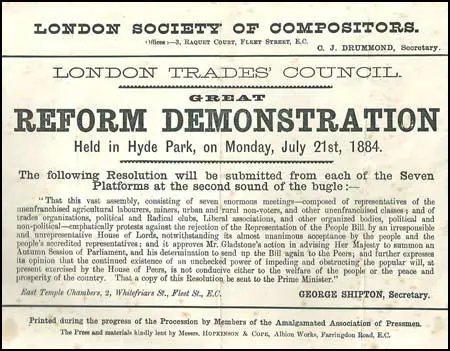
On this day in 1892 Pearl Sydenstricker was born in Hillsboro, West Virginia. The daughter of Presbyterian missionaries, Absalom Sydenstricker (1852-1931) and Caroline Stulting (1857–1921), was raised in Zhenjiang.
Buck returned to the United States in 1911 and studied at Randolph-Macon Woman's College. Buck developed left-wing political views at university and was a strong supporter of women's suffrage.
In 1914 Buck returned to China and three years later married an agricultural economist missionary, John Lossing Buck. The couple moved to Suzhou, a small town on the Huai River.
In 1920 the Bucks moved to Nanjing. Pearl taught English Literature at Nanjing University and the Chinese National University. In 1924, they returned to the United States where Pearl earned her Masters degree from Cornell University. The following year they returned to China.
Pearl Buck's first novel, East Wind: West Wind, was published in 1930. This was followed by the highly successful The Good Earth (1931). It won the Pulitzer Prize "for her rich and truly epic descriptions of peasant life in China". It also inspired a Broadway play and an award-winning film.
In 1934, the Bucks moved back to the United States. The following year she divorced John Lossing Buck and married Richard Walsh, the president of the John Day Company and her publisher. In 1935, she bought a sixty-acre homestead she called Green Hills Farm in Pennsylvania and moved into the one hundred year-old farmhouse on the property with her second husband and their family of six children. Pearl Buck continued to write novels and this included The Mother (1934), House of Earth (1935), The Exile (1936), Fighting Angel (1936) and The Proud Heart (1938).
Pearl S. Buck was a strong advocate of women's rights and wrote essays such as Of Men and Women (1941) and American Unity and Asia (1942) where she warned that racist and sexist attitudes would damage long-term prospects of peace in Asia. She also helped left-wing writers, Edgar Snow, Agnes Smedley and Anna Louise Strong reach American audiences.
After the Second World War Buck became a strong critic of American foreign policy. Robert Shaffer has argued: "Buck's early writings portrayed the subordination of Chinese women, but by the late 1930s she was also highly critical of formal and informal discrimination against women in the United States. While consistantly critical of Stalinism, Buck was an early opponent of the Cold War and of the American military build-up in the late 1940s, warning of American tendencies toward fascism." Buck also advocated recognition of the People's Republic of China and opposed U.S. policy in the Korean War.
Other novels by Buck included Dragon Seed (1942), Townsman (1945), Pavilion of Women (1946), A Long Love (1949), God's Men (1951), The Hidden Flower (1952), Come, My Beloved (1953), Imperial Women (1956), Letter from Peking (1957), Command the Morning (1959), The Living Reed (1963), Death in the Castle (1965), The Time Is Noon (1966), The New Year (1968), The Three Daughters of Madame Liang (1969) and Mandala (1970).
Pearl Buck died of lung cancer in Danby, Vermont, on 6th March, 1973.
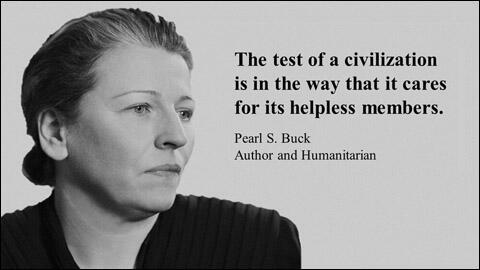
On this day in 1901 Stuart Symington was born in Amherst, Massachusetts. Soon afterwards the family moved to Baltimore, Maryland. In 1918 he joined the U.S. Army and by they time he left he had reached the rank of second lieutenant.
After graduating from Yale University Symington he briefly became a newspaper reporter in Baltimore. Later he worked as an iron moulder in Rochester (1923-26). After studying mechanical and electrical engineering by correspondence course he became an executive with a steel company. In 1938 he moved to St. Louis to become president of the Emerson Electric Manufacturing Company.
As a member of the Democratic Party, in 1947, Harry S. Truman appointed Symington as his Assistant Secretary of War for Air. This was followed by holding the posts of Secretary of the Air Force (1947-1950), chairman of the National Security Resources Board (1950-51) and Reconstruction Finance Corporation Administrator (1951-52).
In 1952 Symington was elected to the Senate. He became a respected political figure and in 1960 attempted to win the party's presidential nomination. John F. Kennedy won the nomination and decided to make Symington his running-mate. When Clark Clifford brought him the news, Symington accepted the post but said: "I bet you a hundred dollars that no matter what he says, Jack will not make me his running mate. He will have to pick Lyndon".
In the background Philip Graham and Joseph Alsop were attempting to persuade John F. Kennedy to appoint Lyndon B. Johnson instead. Despite the objection of Robert Kennedy and other leading advisers, Kennedy decided to replace Symington with Johnson.
Stuart Symington served in the Senate until his resignation on 27th December, 1976. He lived in New Canaan, Connecticut until his death on 14th December, 1988.
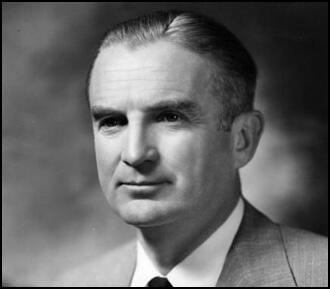
On this day in 1908 Salvador Allende was born in Valparaiso, Chile. As a medical student he became involved in radical politics and he was arrested several times while at university.
In 1933 Allende helped to found the Chilean Socialist Party, a Marxist organization that was opposed to the Soviet Union influenced Communist Party.
Allende was elected to the Chamber of Deputies in 1937 and served in the government of Pedro Aguirre Cerda as Minister of Health (1939-41). He was also senator between 1945 and 1970.
Allende was an unsuccessful candidate for president in 1952, 1958 and 1964. When he was elected as president in 1970 he became the first Marxist to gain power in a free democratic election. The new government faced serious economic problems. Inflation was running at 30 per cent and over 20 per cent of the male adult population were unemployed. It was estimated that half of the children under 15 suffered from malnutrition.
Allende's decide to take action to redistribute wealth and land in Chile. Wage increases of around 40 per cent were introduced. At the same time companies were not allowed to increase prices. The copper industry was nationalized. So also were the banks. Allende also restored diplomatic relations with Cuba, China and the German Democratic Republic.
The CIA arranged for Michael V. Townley to be sent to Chile under the alias of Kenneth W. Enyart. He was accompanied by Aldo Vera Serafin of the Secret Army Organization (SAO). Townley now came under the control of David Atlee Phillips who had been asked to lead a special task force assigned to remove Allende.
The CIA attempted to persuade Chile's Chief of Staff General Rene Schneider, to overthrow Allende. He refused and on 22nd October, 1970, his car was ambushed. Schneider drew a gun to defend himself, and was shot point-blank several times. He was rushed to hospital, but he died three days later. Military courts in Chile found that Schneider's death was caused by two military groups, one led by Roberto Viaux and the other by Camilo Valenzuela. It was claimed that the CIA was providing support for both groups.
Allende's attempts to build a socialist society was opposed by business interests. Later, Henry Kissinger admitted that in September 1970, President Richard Nixon ordered him to organize a coup against Allende's government. A CIA document written just after Allende was elected said: "It is firm and continuing policy that Allende be overthrown by a coup" and "it is imperative that these actions be implemented clandestinely and securely so that the USG (United States government) and American hand be well hidden."
David Atlee Phillips set Michael V. Townley the task of organizing two paramilitary action groups Orden y Libertad (Order and Freedom) and Protecion Comunal y Soberania (Common Protection and Sovereignty). Townley also established an arson squad that started several fires in Santiago. Townley also mounted a smear campaign against General Carlos Prats, the head of the Chilean Army. Prats resigned on 21st August, 1973.
On 11th September, 1973, a military coup removed Allende's government from power. Salvador Allende died in the fighting in the presidential palace in Santiago. General Augusto Pinochet replaced Allende as president.
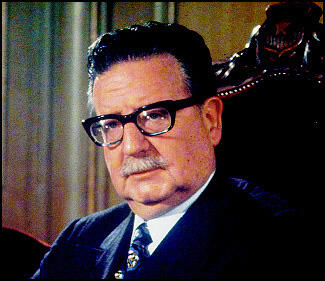
On this day in 1921 war-hero Violette Bushell, the daughter of an English father and a French mother, was born in France on 26th June, 1921. She spent her early childhood in Paris where her father drove a taxi. Later the family moved to London and she was educated at a Brixton Secondary School. At the age of fourteen Violette left school and became a hairdresser's assistant. Later she found work as a sales assistant at Woolworths in Oxford Street.
During the Second World War Violette met Etienne Szabo, an officer in the Free French Army. The couple decided to get married (21st August 1940) when they discovered that Etienne was about to be sent to fight in North Africa.
Soon after giving birth to a daughter, Tania Szabo, Violette heard that her husband had been killed at El Alamein. She now developed a strong desire to get involved in the war effort and eventually joined the Special Operations Executive (SOE). She told a fellow recruit: "My husband has been killed by the Germans and I'm going to get my own back."
At first SOE officers had doubts about whether Violette Szabo should be sent to France. One officer wrote: "She speaks French with an English accent. Has no initiative; is completely lost when on her own. Another officer argued: "This student is temperamentally unsuitable... When operating in the field she might endanger the lives of others."
Colonel Maurice Buckmaster, head of SOE's French operations, overruled these objections and after completing her training Violette was parachuted into France where she had the task of obtaining information about the resistance possibilities in the Rouen area. Despite being arrested by the French police she completed her mission successfully and after being in occupied territory for six weeks she returned to England.
Violette returned to France in June 1944 but while with Jacques Dufour, a member of the French Resistance, was ambushed by a German patrol. By providing covering fire Szabo enabled Dufour to escape. Szabo was captured and taken to Limoges and then to Paris. After being tortured by the Gestapo she was sent to Ravensbruck Concentration Camp in Germany.
Some time in the spring of 1945, with Allied troops closing in on Nazi Germany, Violette Szabo was executed. She was posthumously awarded the Croix de Guerre and the George Cross. Her story is told in the book and film entitled Carve Her Name With Pride.
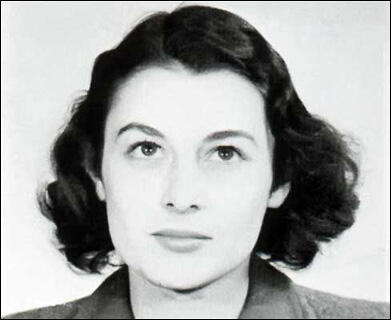
On this day in 1938 poet James Weldon Johnson died in Wiscasset, Maine. Johnson was born in Jacksonville, Florida, on 17th June, 1871. After obtaining degrees from Atlanta University and Columbia University he worked as a teacher in Jacksonville. He continued his studies and after reading law he became the first African American since the Civil War to be admitted to the bar in Florida.
Johnson also wrote poems and in 1900 his brother, John Rosamond Johnson, added music to Lift Every Voice and Sing. It was a great success and in 1901 the brothers moved to New York and over the next few years they wrote over 200 songs for Broadway musicals.
President Theodore Roosevelt appointed him as United States consul to Venezuela. Three years later was given a similar post in Nicaragua (1909-14). In 1916 Johnson became executive secretary of the National Association for the Advancement of Coloured People (NAACP). He had the post until 1929 when he was replaced as head of the NAACP by his protege, Walter Francis White.
Johnson wrote a large number of books including a novel about a light-skinned black man who poses as a white man, Autobiography of an Ex-Coloured Man (1912), Fifty Years and Other Poems (1917), God's Trombones (1927), an African American history of New York, Black Manhattan (1930), his autobiography, Along This Way (1933) and Selected Poems (1935).
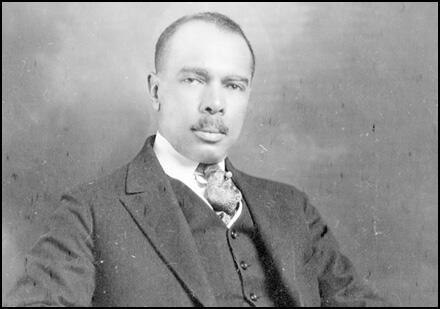
James Weldon Johnson
On this day in 1939 novelist Ford Madox Ford died. Ford Hermann Hueffer, the son of Francis Hueffer, the music critic of The Times, was born in 1873. He was also the grandson of the artist, Ford Madox Brown. Hueffer published his first book, The Brown Owl (1891), when he was only eighteen. This was followed by the novel, The Shifting of Fire (1892).
In 1894 Hueffer eloped with and married Elsie Martindale. He met Joseph Conrad and together they co-authored several works including The Inheritors (1901) and Romance (1903). His most successful books during this period was the trilogy, The Fifth Queen (1906), the story of Catherine Howard.
In 1908 Hueffer founded the English Review and over the next 15 months he published the work of Thomas Hardy, H. G. Wells, D. H. Lawrence and Wyndham Lewis. Huseffer's support of modernism did much to shape the course of 20th century writing.
In June 1914, Hueffer's published the first part of his novel, The Saddest Story, in Blast Magazine. The full version, retitled, The Good Soldier, A Tale of Passion, appeared in 1915, and is now considered to be the most important of the 80 books that he produced during his lifetime.
Soon after the outbreak of the First World War, Hueffer was recruited by Charles Masterman, the head of Britain's War Propaganda Bureau (WPB), to write pamphlets that would help shape public opinion. Hueffer, embarrassed by his German name and heritage, was the most passionate of all the writers that worked for the WPB. Hueffer's first contribution, When Blood is Their Argument, was an attack on German literature, art and music. In the pamphlet Ford claimed that the German education system had spread the "rot of Prussian culture throughout he world".
Hueffer followed this with Between St. Dennis and St. George, a reply to Common Sense about the War, a pamphlet written by George Bernard Shaw that had been highly critical of Sir Edward Grey and the government's foreign policy. Hueffer also took the opportunity to attack Britain's pacifist intellectuals, such as H. N. Brailsford, Fenner Brockway, Norman Angell and Bertrand Russell, In the pamphlet Hueffer described these men as "pro-Prussian apologists".
In 1916 Hueffer abandoned his career as a propagandist and joined the British Army. He was sent to France in July 1916 as a junior officer in the 38th Infantry Brigade. Hueffer served in the transport division and therefore never involved in trench warfare. However, his experiences with the dead and dying in the military hospitals made him question the role he had played in persuading so many men to join the armed forces. Especially when he discovered that the incompetence of Britain's military leaders was causing the unnecessary deaths of large numbers of soldiers. .
At Mametz Wood, where the 38th Infantry Brigade suffered heavy casualties during the Battle of the Somme, Hueffer was knocked unconscious by a nearby exploding shell and suffered concussion. Hueffer blamed General Henry Rawlinson for the disaster at Mametz Wood and deeply upset by the loss of so many comrades, was later to write: "I don't think that many of those who were one's comrades did not at times feel a certain hopelessness. And so they would sit in the chairs of the lost and forgotten. You will say this is bitter. It Is. It was bitter to have seen the 38th Division murdered in Mametz Wood - and to guess what underlay that."
In 1919 Hueffer changed his name to Ford Madox Ford. Three years later he moved to Paris where he founded the Transatlantic Review. Over the next year Ford published the work of several important new writers including James Joyce and E. E. Cummings.
In the 1930s Ford published two volumes of autobiography, Return to Yesterday (1931) and It was the Nightingale (1933).
